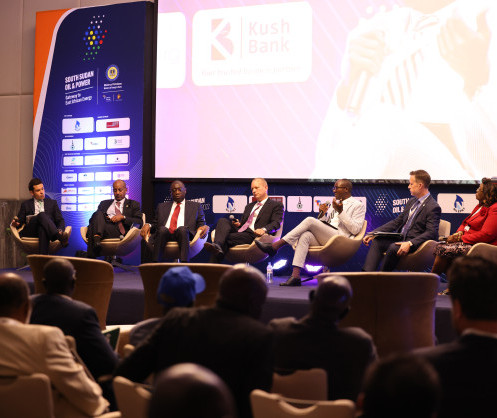With South Sudan seeking to attract foreign investment to boost activities across the entire hydrocarbons sector, the South Sudan Oil and Power conference and exhibition (https://bit.ly/3A1hgvV) – currently underway in Juba, highlighted how both the country and the African continent can tackle its increasing investment gap and maximize oil and gas development and exploitation for energy security and economic growth.
During a panel discussion entitled ‘Capital Quest: Tackling Financing Challenges and Barriers to Doing Business’ which was sponsored by Stanbic and moderated by Hugo Hill, Managing Director, TRM Risk Management, speakers including Admassu Tadesse, President Emeritus and Group MD, TDB; Rene Awambeng, Global Head, Client Relations, The African Export-Import Bank (Afreximbank); Matt Rodgers, Chief Commercial Officer, Chemex Global, Inc.; Ngosong Fonkem, Attorney, Page Fura PC; Ryan O’Grady, Acting CEO, Kush Bank; Victoria Otieno, Managing Director, Alpha Commercial Bank discussed best financial solutions required to enable the country to execute innovative new oil and gas developments.
Commenting on how South Sudan and Africa can position itself as an energy investment destination, Tadesse said “We are saying to producers to show us how innovative your projects are and we and other investors will come to the party. African energy producing countries need to resolve micro-finance terms in their own environments to be able to attract financing from external parties.”
African energy producing countries need to resolve micro-finance terms in their own environments to be able to attract financing from external parties
Commenting on Africa’s ability to finance its own energy revolution, Awambeng said “We as Africans should stop looking for financing elsewhere. Africa has the experience, resources and funding required to develop its own resources. Today, our continent is a net exporter of raw materials and a net importer of refined materials which we are buying at three times the price to power our energy needs. Western investors are abandoning to fund the resources in Africa due to various reasons and what is left for African firms is to support themselves. Promoting intra-African trade will be key to solving this investment gap. We as Africans need to take the opportunity of investing in our own borders.”
Awambeng added that “We don’t believe the challenge is in financing, we need to work together to come up with innovative solutions and see how we can transform our resources. Why can’t we build refineries and import refined products. We believe we can raise the money to fund our resources and that is why after COP27, we decided to develop the African Energy Bank. That’s why we are calling for African producers to sign up in November so that we can work together to expand Africa’s energy market. We are finalizing the terms for the creation of the bank. Stakeholders in South Sudan and across Africa have to create the right kind of enablers that will attract investors.”
With sanctions disrupting investments across South Sudan’s downstream sector, Rodgers also urged local investors to collaborate on building infrastructure such as refineries and to stop relying on external funding.
Kush Bank’s O’Grady, added that “We have to do more now. We have to reach out with our partners in government and improve the level of communication. When I talk about competitiveness, it is important to talk about local SMEs. People are not lending to them because they are “too high risk.” We have a responsibility as national banks to take that risk and make that investment. This is why for the next five years; Kush is focused on how to develop the local SME industry. If we don’t do this, how do we mature the industry?”
Otieno added that “There are a number of challenges that are faced in this country and the government has gone out of its way to try and mitigate these challenges. The central bank has been actively involved in intervening in the market. The challenge is, there is not enough liquidity to push that exchange rate down. We need to work together and push liquidity in the market. We have an erratic currency. When you are in the oil and gas sector, you tend to have booms and slumps. I am happy that Afreximbank has been able to come in and help stabilize, providing a facility for the flow of funds to be consistent in the market. When we look at how the local content players come in, we recognize an issue of a lack of track record. We need to come together as both local and international and put together a fund to improve the quota of letters of credit, and as such, improve trade.”
Advocating for increased development and implementation of African financial solutions to fast-track energy developments – and thanking Afreximbank for the signing of a Memorandum of Understanding with the African Petroleum Producers’ Organization for the development of the African Energy Bank – NJ Ayuk, Executive Chairman of the African Energy Chamber joined the discussion, stating that “It is you South Sudan and Africa that have the solution to enable the continent to address its financing gap and avoid going to international markets in search of funding. By boosting local solutions, we will be able to develop our own oil and gas developments on our terms.”
![]()




